There are two things to be said initially about Felicity Kendal. One – my dad fancied her when she played Barbara in The Good Life. Actually, everybody’s dad fancied her when she was Barbara in The Good Life. Secondly – she doesn’t look much different now from how she was when she played Barbara, and considering that programme was made over 35 years ago and she’s now in her mid-60s, that’s not bad really.
Ooh, actually – make that three things. As well as her acting abilities, she is also well known for having an affair with playwright Tom Stoppard. The tabloids loved that one, they did.
Oh and if you really must – here’s a fourth thing. Her surname isn’t really Kendal. It’s Bragg. Her real name is Felicity Ann Bragg, and if that surname sounds familiar then it is; the family have a distant relation in The South Bank Show’s Melvyn Bragg. It was her father who changed the family name to Kendal (after his place of birth) to use as his performing name. I wonder what he’d have done if he’d been born in Appleby-in-Westmorland?
Actually – I can think of another thing. That’s five. Felicity contracted typhoid in Calcutta when she was 17.
Ooh, and something else….no, this is getting silly now. Let’s crack on, shall we?
Whilst Felicity Kendal has had a long-running and well-recognised career on both stage and screen (she made her first appearance in A Midsummer Night’s Dream aged nine months), it was definitely the very cute character of Barbara in the BBC show that propelled her to fame. Barbara Good was the ultimate liberated 1970’s woman: not only was she cute and funny, she was eco-friendly, immensely loyal to her could-be-a-bit-of-a-sulky-wotsit-husband Tom, and was able to make her opinions heard and paid attention to. And she looked good in dungarees, which is not something everybody can say. As is the problem with many actors who come to be associated with a great role, the public often assume that Kendal is Good – and Felicity has been known to point out in interviews that she actually has a short temper and can be tricky to work with. Not so cute after all…
Although Kendal was born in England (Olton in Warwickshire to be exact – the same place that also gave us Johnnie Walker, the Radio 2 ‘Sounds of the 70s’ DJ) she did a great deal of her growing up in India (she is a fluent Hindi speaker) where her father toured the country as an actor and manager of a theatre group called Shakespeareana. It was a Kendal family enterprise, and Felicity spent her childhood acting in minor roles (often as boys) in the productions, attending local convent schools as they moved around. In 1965 the filmmakers Ivory and Merchant (who were friends of the family) wrote the movie Shakespeare-Wallah, based on the Kendals, and this gave Felicity her first leading role.
She stayed in India until she was 20, returning to England after this and looking for film and television work without much success. She made her stage debut however, in London in 1967, in a play entitled Minor Murder, and from there built on a highly successful theatre career. During the next three decades she went on to perform in many plays in the British theatre and in 1989 she won an Evening Standard Theatre Award, but it was her ‘collaboration’ with Tom Stoppard that proved the most prolific for Kendal in live theatre, starring in many of his works. This included a role written by Stoppard exclusively for her in 1995’s Indian Ink.
As far as television goes however, it wasn’t until The Good Life that Kendal became a British household name. Before this she appeared in (amongst others) episodes of Love Story, Man in a Suitcase (you’d recognise the theme tune, it was reused by Chris Evans for TFI Friday...) and The Tenant of Wildfell Hall in the 1960s, The Woodlanders and Jason King in the ‘70s and Solo and The Mistress in the 1980s. Solo was an interesting one; written by Butterflies and Bread’s Carla Lane it had Lane’s standard mix of gentle humour and serious moments – and for me at least it always felt like I was almost on the point of laughing; it was trying really hard to be funny, and on occasions was just about to be funny, but never quite got there. Kendal was pretty good as Gemma Palmer, a woman who had been cheated on by her boyfriend, and was now living alone – hence the title – but there were still too many shades of Barbara about her, albeit without the spark that made Mrs Good the feisty woman she was.
Another stab at sitcoms led to Honey for Tea in 1994 (nope, me neither). I am guessing however, that the fact only 7 episodes were ever made meant that it wasn’t a hugely popular programme. The nation’s thirst for a gardening detective show (well I mean, who hasn’t ever wanted one of those?) was finally quenched in 2003 when ITV broadcast the first series of Rosemary & Thyme. It was Marple like in its ‘there’s been a brutal murder but it happened in a setting of such pretty English quaintness that it’s not all that bad really’ vibe, and the plot centred around Rosemary Boxer (Kendal) and Laura Thyme (Pam ‘Darling Buds of May’ Ferris) ferreting around in people’s gardens, and overhearing naughty criminals murmuring about their bad deeds behind large conifers. If you liked both grisly deaths and geraniums, the three series of Rosemary & Thyme were ideal for you.
In the last few years Kendal has moved into the more ubiquitous arena of reality television, taking part in series 8 of Lose Weight Whilst Wearing a Spangly Costume - I mean Strictly Come Dancing (she and her partner got kicked out in week 8, in case you were wondering. Oh, you weren’t) and then invited squashed-face Piers Morgan to interview her as part of his probing Life Stories series in 2012.
So there we have it. Felicity Kendal in a nutshell. And as she’s only four foot eleven that could well have happened if she’d tripped on the set of Rosemary & Thyme.








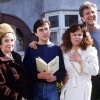
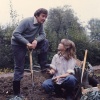
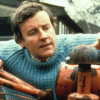

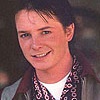
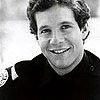
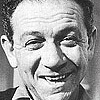



Do You Remember Felicity Kendal?
Do You Remember Felicity Kendal?